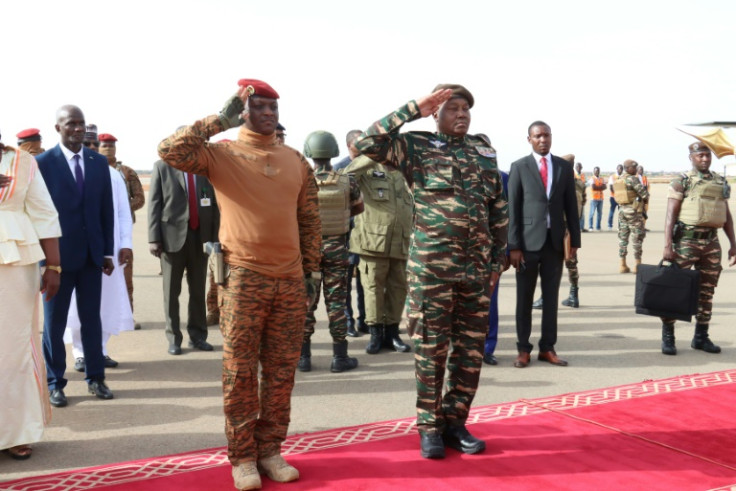
The military regimes of Niger, Mali and Burkina Faso marked their divorce from the rest of West Africa Saturday as they signed a treaty setting up a confederation between them.
The first summit of the three countries, who all pulled out of the Economic Community of West African States (ECOWAS) earlier this year, also saw calls for greater cooperation across a wide range of sectors.
"Our people have irrevocably turned their backs on ECOWAS," Niger's ruling General Abdourahamane Tiani told his fellow Sahel strongmen at the gathering's opening in the Nigerien capital Niamey.
The three leaders, who took power through coups in recent years, "decided to take a step further towards greater integration" and "adopted a treaty establishing a confederation", they said in a statement issued at the end of the summit.
The "Confederation of Sahel States", which will use the acronym AES and be headed by Mali in its first year, will group some 72 million people.
Their ECOWAS exits were fuelled in part by accusations that Paris was manipulating the bloc, and not providing enough support for anti-jihadist efforts.
"The AES is the only effective sub-regional grouping in the fight against terrorism," Tiani declared on Saturday, calling ECOWAS "conspicuous by its lack of involvement in this fight".
The exit came as the trio shifted away from former colonial ruler France, with Tiani calling for the new bloc to become a "community far removed from the stranglehold of foreign powers".
All three have expelled anti-jihadist French troops and turned instead towards what they call their "sincere partners" -- Russia, Turkey and Iran.
In early March, the AES announced joint anti-jihadist efforts, though they did not specify details.
Insurgents linked to Al-Qaeda and the Islamic State group have carried out attacks for years in the vast "three borders" region between Niger, Mali and Burkina Faso, despite the massive deployment of anti-jihadist forces.
ECOWAS is due to hold a summit of its heads of state in the Nigerian capital Abuja on Sunday, where the issue of relations with the AES will be on the agenda.
Relations between ECOWAS deteriorated following a July 2023 coup that brought Tiani to power, when the bloc imposed sanctions and even threatened to intervene militarily to restore the ousted president, Mohamed Bazoum.
The sanctions were lifted in February but relations between the two sides remain frosty.
After several bilateral meetings, this is the first meeting of all three Sahelian strongmen since coming to power through coups between 2020 and 2023.
Niger's Tiani first welcomed his Burkinabe counterpart Ibrahim Traore in the capital on Friday, followed by Malian Colonel Assimi Goita who arrived Saturday.
"The aim is to show that this is a serious project with three committed heads of state showing their solidarity," said Gilles Yabi, founder of the West African think tank Wathi.
The trio have made sovereignty a guiding principle of their governance and aim to create a common currency.
Sunday's summit comes as several West African presidents have called in recent weeks for a solution to resume dialogue between the two camps.
Notably, Senegal's new President Bassirou Diomaye Faye said in late May that reconciliation between ECOWAS and the three Sahel countries was possible.
In June, his newly re-elected Mauritanian counterpart, President Mohamed Ould Cheikh El Ghazouani, called on West African countries to unite again against the expansion of jihadism.
But the successive summits on the same weekend raise fears of a stiffening of positions between the AES and ECOWAS.
"I do not see the AES countries seeking to return to ECOWAS. I think it's ECOWAS that will have to tone it down (the situation)," Nigerien lawyer Djibril Abarchi told AFP.
Beyond military cooperation, the leaders Saturday also talked about "mutualising" their approach to strategic sectors such as agriculture, water, energy and transport.
They also asked that indigenous languages be given greater prominence in local media.
The question of creating a common currency to replace the CFA franc was not mentioned in the final communique.








